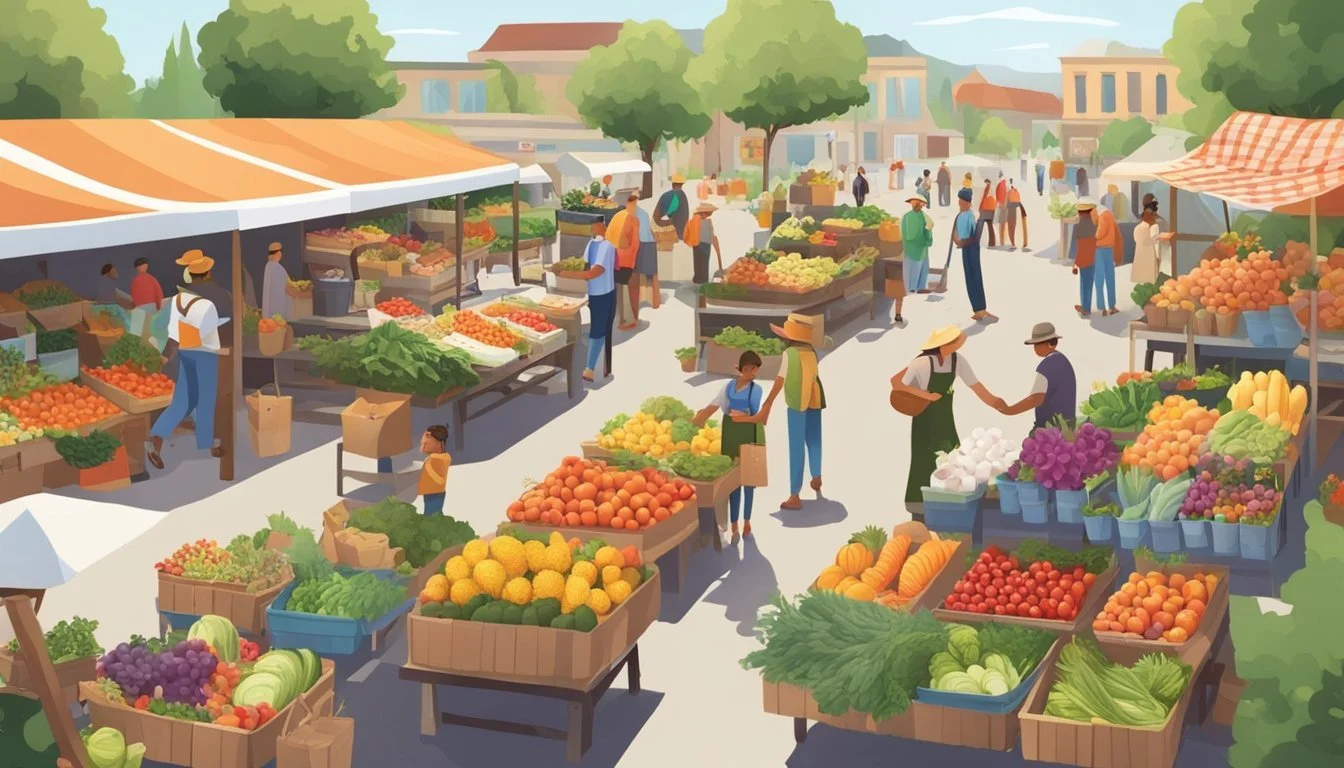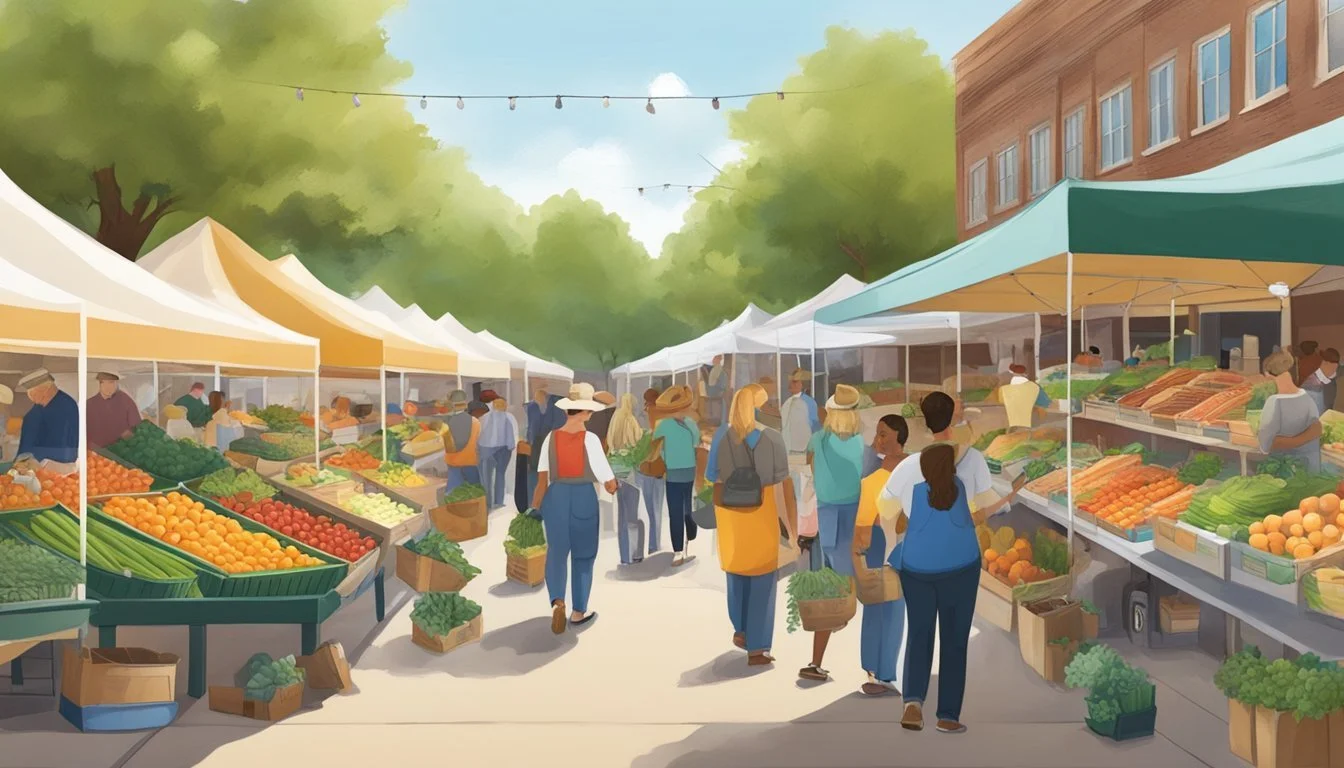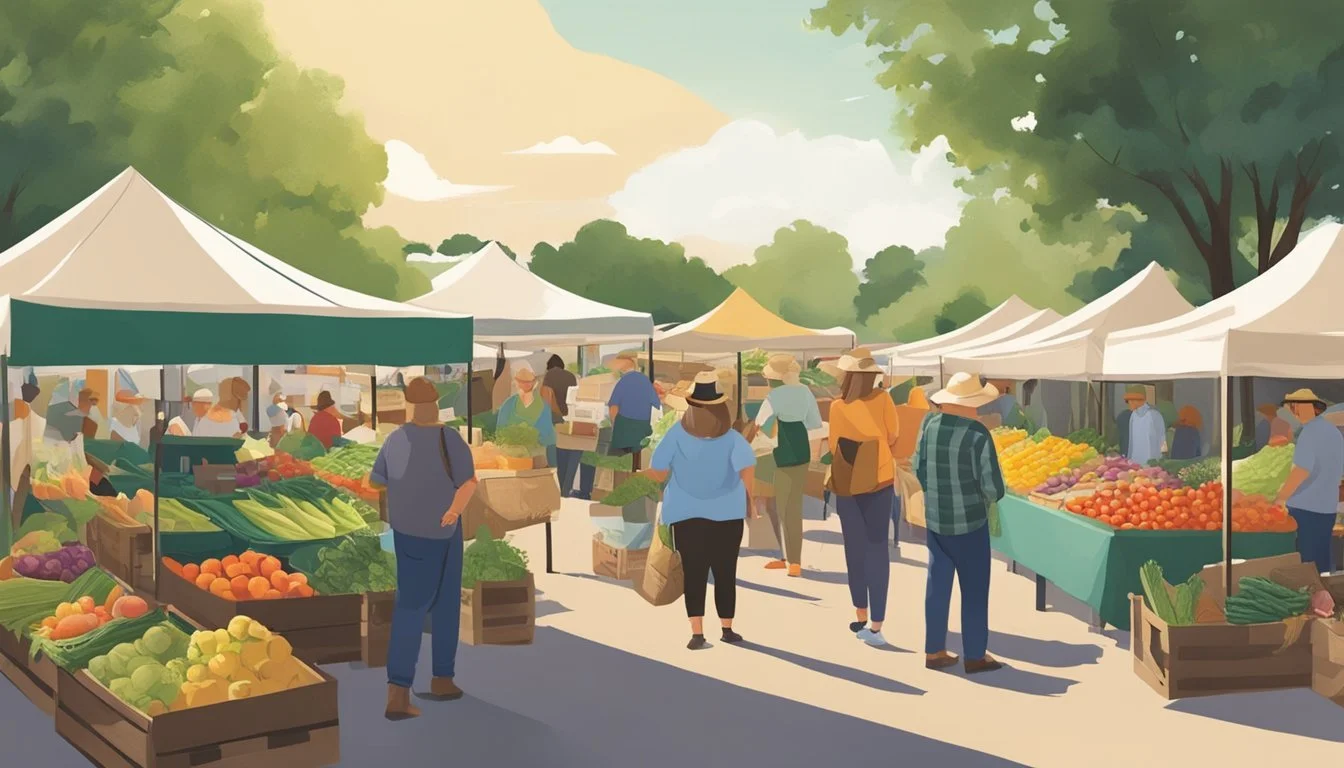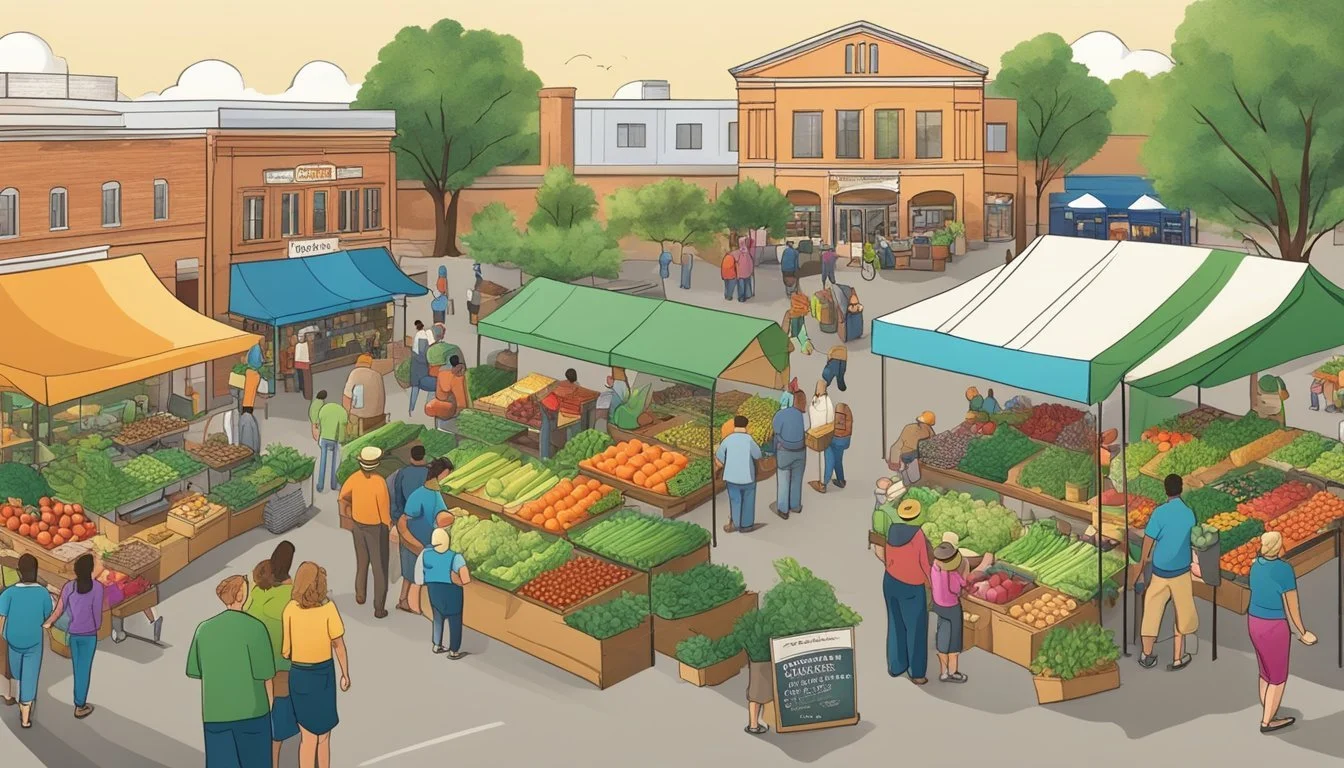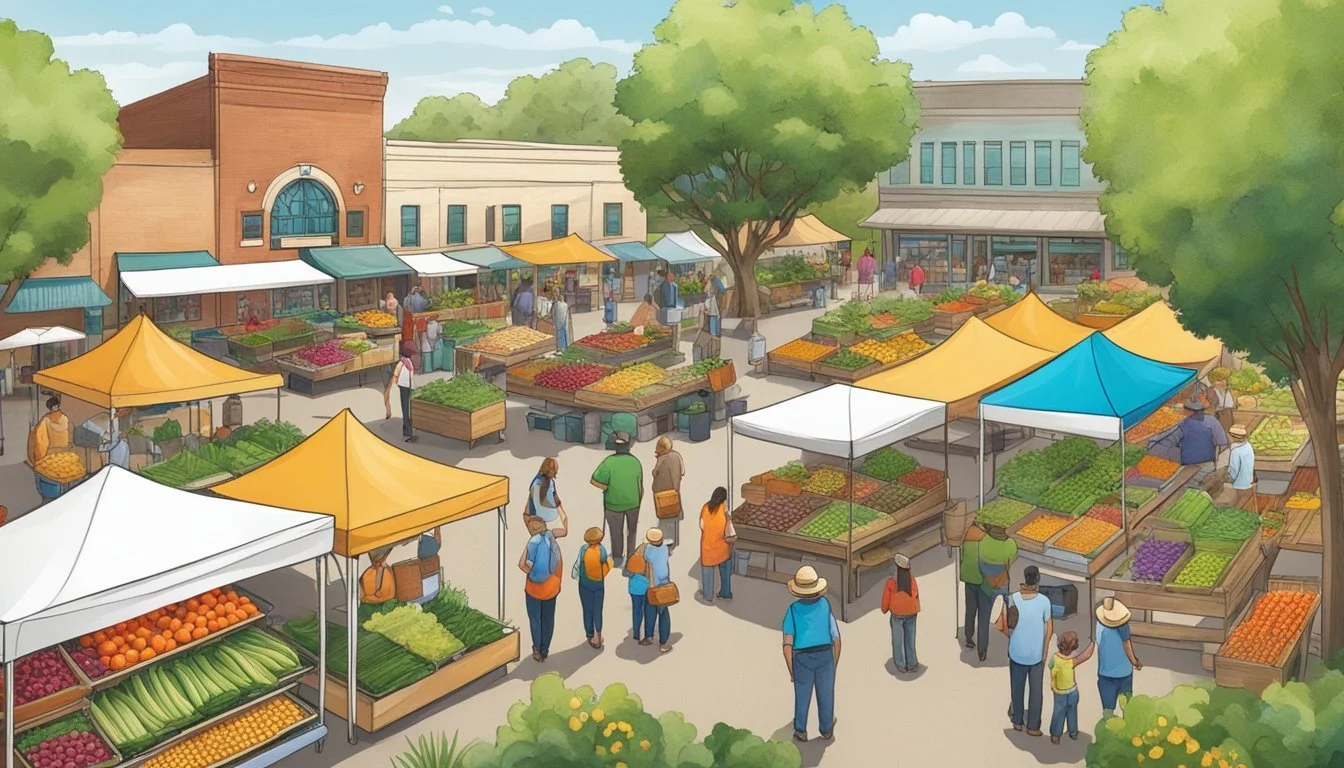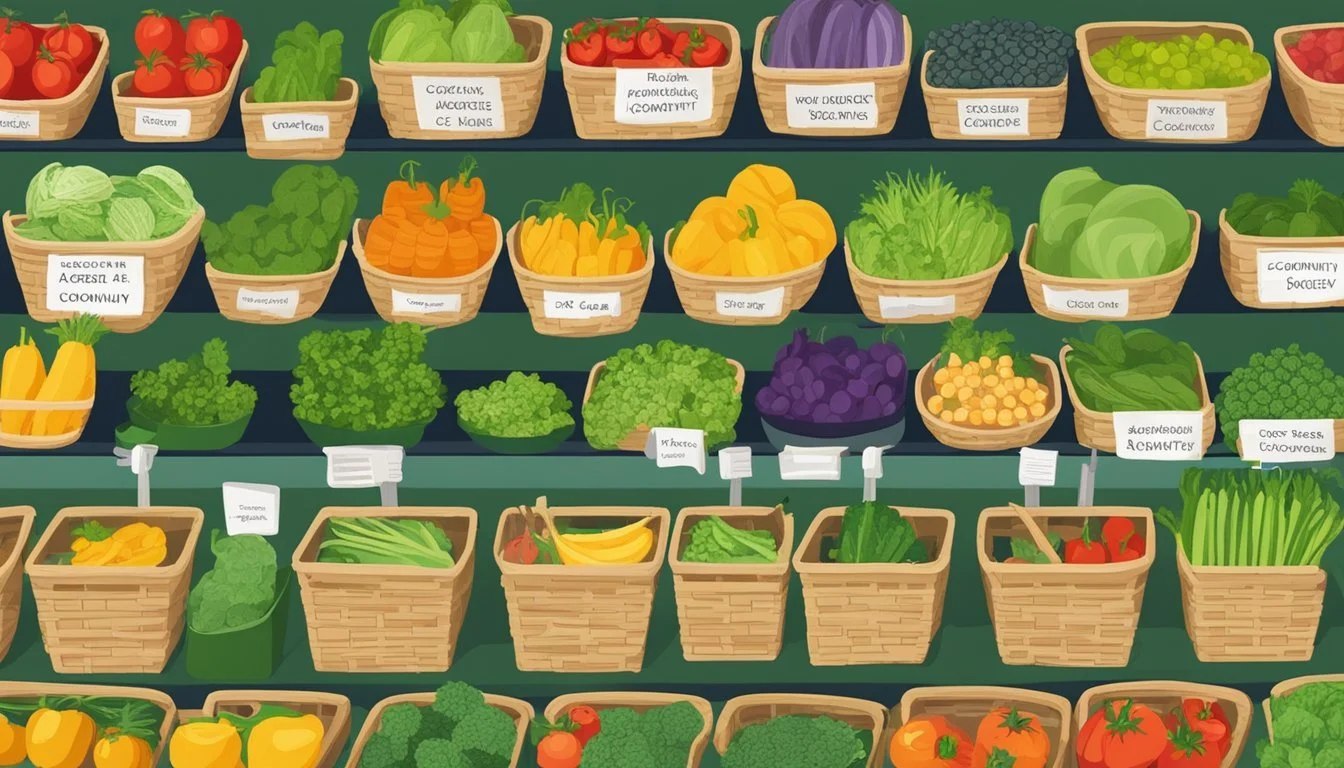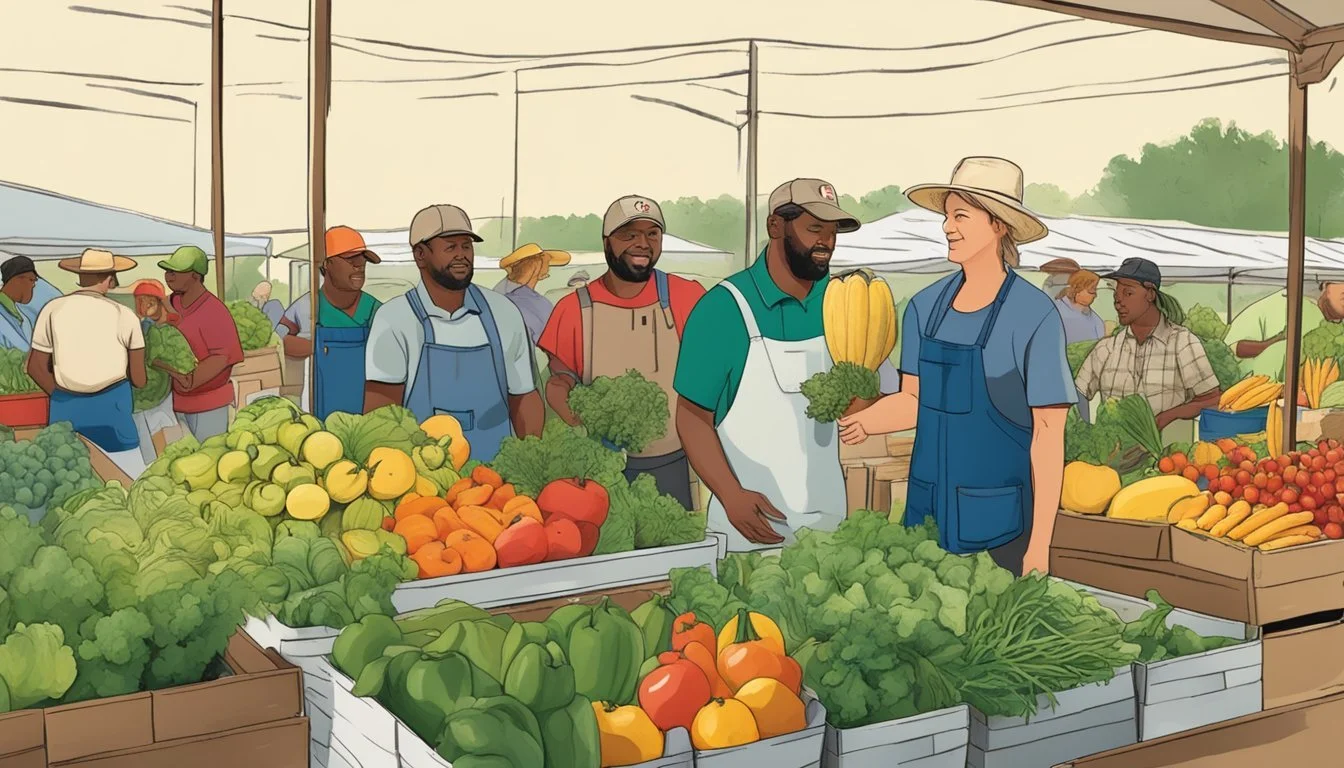Community Supported Agriculture (CSA) in Wichita Falls, TX
A Guide to Local Produce Subscriptions
Community Supported Agriculture, commonly known as CSA, has taken root in Wichita Falls, TX, forging a symbiotic relationship between local farmers and the community. This agricultural model thrives on the commitment of community members who purchase memberships or shares from local farms. In return, these members receive a weekly bounty of fresh produce during the growing season. The partnership not only provides financial stability for farmers by covering early-season operational costs but also allows consumers to partake in the rhythm and rewards of farming.
In Wichita Falls, CSA programs are integral in strengthening the local food system and economy. They promote sustainable farming practices and keep food miles to a minimum, ensuring that the freshest and most nutritious produce reaches the tables of the community. Participating in a CSA is a tangible way for residents to support local agriculture and invest in the health of their families and environment.
By bridging the gap between farm and fork, CSAs in Wichita Falls dismantle the anonymous nature of the food chain. Members form a direct connection with the source of their food, gaining insights into the challenges and triumphs of farming. This transparent relationship fosters a sense of trust and shared responsibility, encouraging a community-wide commitment to sustainability and resilience in local food systems.
Understanding CSA
Community Supported Agriculture (CSA) represents a model where members invest in local farm operations, securing shares of the season’s harvest. It's a collaborative relationship that enhances local food economies and tightens the bond between consumers and farmers.
Concept and History
Originating over 25 years ago, CSA started as a way for consumers to purchase local, seasonal food directly from farmers. In this model, individuals commit to supporting a farmer by purchasing a 'share' at the beginning of the growing season. This upfront membership helps cover the initial farm costs.
Benefits for Consumers
By participating in a CSA program, consumers receive fresh, local produce regularly throughout the harvest season. They experience the seasonal rhythms of farming and enjoy a variety of produce grown closer to home. Membership to a CSA often also means getting to know the people who grow your food, fostering a sense of community involvement.
Freshness: Produce is at peak freshness, often picked within hours of delivery.
Knowledge: Consumers learn about the farming process and seasonal variations.
Advantages for Farmers
Local farmers benefit from the CSA model through direct marketing to members, which improves their cash flow and reduces marketing costs. This direct relationship also offers more financial stability as payments are received early in the season, which helps with planning and farm expenses.
Stability: Prepaid shares provide a stable source of income to cover planting and operational costs.
Community Ties: Farmers build strong relationships with consumers, promoting loyalty and understanding.
CSA Structure and Functioning
Community Supported Agriculture in Wichita Falls, TX, centers around a symbiotic relationship between local farmers and community members, providing both with stability and delight during the growing season.
How a CSA Operates
A CSA operates on the principle of upfront investment by community members, which provides the farmer with early-season capital to manage the farm's operations. In Wichita Falls, members pay a fee at the beginning of the season, securing their share of the harvest. This model creates a direct link between the production and consumption of food, offering members insight into the farming process and fostering a sense of community ownership.
Member: Pays upfront fee
Farmer: Receives capital for farm inputs
Harvest: Share of produce distributed regularly
Seasonal Share Management
During the farming season, which varies depending on climate and crop selection, shares of the farm's harvest are allocated to CSA members on a weekly or bi-weekly basis. Farms meticulously plan production schedules to ensure a steady and varied supply of vegetables, fruit, and potentially other farm products. Share distribution is dependent on the season's success, which can be influenced by weather, soil health, and other environmental factors.
Typical Season Timeline in Wichita Falls:
Spring: Planting and early growth; start of the CSA share distributions
Summer: Peak harvest for a variety of crops
Fall: Winding down of production, last distributions
Types of Products Offered
The types of products offered in CSA shares vary. The classic share includes vegetables and fruits that are seasonal and harvested at their peak. Additionally, some CSAs in Wichita Falls may provide options for organic produce, eggs, meat, and even flowers. The emphasis is always on freshness, quality, and sustainable agriculture practices.
Examples of CSA Products:
Vegetables: Tomatoes, peppers, lettuce
Fruit: Berries, melons, apples
Additional Offerings: Eggs, pasture-raised meat, artisanal bread, flowers
Economic and Sustainable Aspects
Community Supported Agriculture in Wichita Falls contributes significantly to the local economy while embracing sustainability. These aspects are critical for maintaining both financial and environmental health in the region.
Supporting Local Economy
Local Businesses and Farms in Wichita Falls thrive through the CSA model. By engaging in CSA, consumers directly support local farmers, ensuring that their income is stable and more predictable. This economic model not only bolsters the local economy but also helps in maintaining the viability of small farms. Direct sales to the community mean that local food is accessible, and income remains within the community, fostering growth and financial resilience.
Advantages for the economy:
Income security for farmers
Growth of local food market
Investment in the community
Sustainability and Environment
Sustainable practices are at the core of Community Supported Agriculture. Wichita Falls CSA prioritizes environmental health through the promotion of organic and sustainable production techniques. This leads to numerous benefits including soil conservation, water preservation, and biodiversity. By localizing the food supply, CSAs can also decrease carbon footprints associated with transportation. Thus, the CSA approach is a champion for the environment, ensuring that agriculture in the area sustains the land it depends on.
Environmental benefits:
Reduced transportation emissions
Conservation of natural resources
Promotion of organic farming
Participating in CSA
Community Supported Agriculture in Wichita Falls, TX, offers an opportunity for individuals to engage with local farms on a deeper level. Membership provides access to fresh, seasonal produce while supporting local agriculture.
Becoming a CSA Member
Anyone interested in becoming a CSA member in Wichita Falls may sign up for a subscription with a local farm offering this service. One typically purchases a share at the beginning of the growing season, thereby investing in the farm's production. This upfront commitment aids farmers in planning and ensures financial support for the entire season. To become a member, individuals should:
Research local CSA programs to find one that fits their needs.
Contact the chosen farm directly to inquire about availability and specific terms.
Sign up and pay for the selected subscription, which can vary in terms of duration and size.
What to Expect as a Member
As a CSA member, individuals can expect a weekly share of the farm's harvest throughout the growing season. Shares are often distributed at designated pick-up locations or delivered directly to members. A subscription could include:
Assorted vegetables
Seasonal fruits
Herbs
Optional add-ons such as eggs or honey
Members share in both the bounty and the risks of farming, meaning the weekly share may vary based on what is seasonally available and how well the crops perform. Participating in a CSA encourages a community-oriented approach to food consumption, fosters a connection to the land, and promotes health through nutritious food choices. Resources provided by the CSA can also educate members on how to prepare and store the fresh produce they receive.
Impact on Community
Community Supported Agriculture (CSA) in Wichita Falls, Texas has redefined the way local consumers engage with agriculture, fostering a symbiotic relationship that benefits both parties. Through CSAs, consumers gain direct access to fresh, locally-grown produce, while farmers receive upfront financial support.
Strengthening Local Ties
CSAs have played a central role in strengthening the bond between Wichita Falls residents and local farms. By committing to CSA programs, community members become partners in the agricultural process, sharing both the risks and bounties of farming. This partnership has led to a robust local food culture, where producers and consumers are interdependent. Regular interaction between members and farmers at pickup sites, often the local farmers market, builds a sense of communal investment and responsibility for the success of the local farm economy.
Morath Orchard exemplifies this, as noted in search results; community members pay a fee to cover initial farm costs and receive a weekly share of the harvest.
Local economic impacts include:
Increased financial stability for farmers through memberships
Money spent on CSAs circulates within the local economy, supporting other businesses
Educational Opportunities
Education is a pivotal component of the CSA model in Wichita Falls. It provides an avenue for consumers and especially children to learn about agriculture and food production. These educational opportunities are crucial in raising awareness of sustainable practices and the importance of supporting local farms.
Farm visits and workshops: Consumers often have the opportunity to visit farms, witness the food production process, and participate in workshops.
Nutrition and cooking demonstrations: These are sometimes organized at CSA pickup locations, providing practical knowledge on utilizing the season's harvest to its full potential.
Through Community Supported Agriculture, Wichita Falls has nurtured a community that values local produce, supports local farmers, and emphasizes education on sustainable agricultural practices.
CSA Programs in Wichita Falls
Community Supported Agriculture (CSA) programs in Wichita Falls, TX, offer residents a way to obtain fresh, local produce while supporting area farmers. These programs bolster the local food economy and foster community connections.
Locating Wichita Falls CSAs
LocalHarvest and similar resources provide listings to help consumers find CSA programs in Wichita Falls. Residents can subscribe to seasonal shares from farms, receiving a regular box of vegetables and occasionally other farm products throughout the growing season. Potential subscribers may contact farmers directly via email or explore online directories to identify active CSAs in the North Texas region.
North Texas Farmers Markets: Locations where CSAs might distribute weekly shares.
Farm Websites and Social Media: Direct channels for updates on CSA availabilities.
Engagement and Activities
CSA programs in Wichita Falls do more than just market fresh produce. They engage the community with various activities that connect them to the region's agriculture.
Farm Visits: Members may have opportunities to visit the farms and meet the farmers.
Community Events: CSAs often host events to celebrate harvests and foster a sense of community among members.
By participating in a local CSA program, Wichita Falls residents play an active role in sustaining the area’s agricultural heritage and contribute to a vibrant local food system.
Cooking and Usage Tips
Community Supported Agriculture (CSA) members often receive a bounty of fresh, seasonal produce that can transform their cooking routines. Leveraging this produce to its fullest potential encourages healthier eating and supports the local community.
Utilizing CSA Produce
One's CSA box from Wichita Falls, TX, typically teems with a variety of fruits and vegetables, many of which are picked at the peak of ripeness. Members should:
Inspect their produce as soon as they receive it.
Plan meals around the most perishable items first, such as leafy greens.
Wash and prep items to make them more convenient to use throughout the week.
Using fresh produce shortly after pickup will ensure one enjoys their food at its most flavorful and nutritious state. Being flexible with recipes and incorporating items such as kale, summer squash, or heirloom tomatoes can elevate simple dishes.
Recipe Ideas and Storage
Crafting meals with CSA produce encourages creativity. Here's a brief guide for culinary inspiration and produce storage:
Salads: Fresh, crisp greens and vibrant veggies make for excellent salads. Dress them with a simple vinaigrette.
Roasting: Root vegetables like carrots and potatoes develop deep flavors when roasted.
Soups: Seasonal squashes and hearty greens contribute to nutritious soups.
It is crucial to store different types of produce appropriately to extend their shelf life:
Produce Type Storage Method Shelf Life Leafy Greens Refrigerator, in a plastic bag with air 5-7 days Root Vegetables Cool, dark place; separate from onions 2-4 weeks Tomatoes On the countertop, away from sunlight 3-7 days Berries Refrigerator, in a single layer 3-5 days
By understanding how to integrate CSA produce into their cooking and how to properly store these items, members can relish the freshness and quality of local, seasonal food, all while fostering a supportive link with their local Wichita Falls farm community.
Success Stories and Challenges
Community Supported Agriculture (CSA) has been a growing phenomenon in Wichita Falls, Texas, reflecting a trend toward sustainable and local food systems. Success stories from this region highlight the resilience and innovation of local agriculture, while the challenges often revolve around distribution logistics and mitigating weather risks.
Case Studies from Around Wichita Falls
In Wichita Falls, several CSAs have demonstrated remarkable growth, becoming integral parts of the local food economy. Farm Fresh Texas, for example, grew from a simple backyard garden to a full-scale CSA program supplying fresh, organic produce to numerous households. They attribute their success to a strong community relationship and consistent consumer education about the benefits of supporting local agriculture.
Another notable CSA is Wichita Valley Farms, which has fostered a prosperous partnership with local schools, offering educational programs alongside their produce delivery. Their efforts have not only increased sales but also raised awareness about healthy eating habits in young people.
Overcoming Distribution Challenges
CSAs in this region face significant distribution challenges. The vastness of Texas can pose logistic hurdles for small farms trying to transport fresh produce efficiently. To combat this, many CSAs have adopted innovative strategies like mobile distribution hubs and on-farm pickups to ensure consistent and timely delivery.
Additionally, extreme weather patterns in Texas, such as drought and heatwaves, often disrupt production schedules and yield consistency. Farms have learned to adapt by diversifying crop selections and employing water-conservative irrigation systems, thereby reducing risk and maintaining a stable supply.
To summarize, the CSAs in Wichita Falls are crafting success stories through community engagement and educational outreach, while continually innovating to overcome the inherent challenges of distribution and weather.
CSA Future and Innovation
Community Supported Agriculture (CSA) in Wichita Falls, Texas, is poised for growth through embracing emerging trends and integrating technology. Innovative approaches and research are shaping the future of CSA.
Emerging Trends in CSA
Local Engagement: Wichita Falls has seen a rising trend in consumer commitment towards local produce. This engagement is fostering growth in CSA programs, where individuals are seeking fresh, seasonal food while supporting local farmers.
Diversified Offerings: With an increase in consumer demand, CSAs are expanding their product range beyond vegetables. The inclusion of fruits, meats, and artisan products is a notable trend.
The CSA Innovation Network Enhancing Communication: This network lays the groundwork to share tools and programs across the CSA community. It's an essential resource for Wichita Falls farmers looking to innovate and connect with other agricultural professionals.
Education and Research Partnerships: CSA operations participate in collaborations with educational institutions. This effort leads to enhanced agricultural practices and sustainable methods, evident in the evolution of CSAs in Wichita Falls.
Technology and CSA
Data-Driven Farming: Technology has ushered in data analytics which allows farmers to optimize planting schedules and yield predictions. CSA models in Wichita Falls could benefit greatly from such advancements.
Online Platforms and Apps: The use of online CSA management software streamlines the subscription process, communication with members, and handling logistics. Such technological tools provide robust solutions for CSA operations, increasing their efficiency and reach.
Solar-Powered Infrastructure: Research into sustainable energy solutions is impacting CSAs. Incorporating solar technology into farm operations cuts down costs and aligns with the eco-conscious values of the CSA model.
Future Technology Adaptations: The potential for drone technology to assist in crop monitoring and the use of AI for market analysis predicts a transformative impact on CSA efficiency and productivity in the coming years.
FAQs and Resources
This section provides answers to frequently asked Community Supported Agriculture questions and directs readers to relevant resources and contacts in Wichita Falls, TX.
Common CSA Questions
What is a CSA?
A Community Supported Agriculture (CSA) program is a partnership between a local farmer and consumers where consumers receive a portion of the farm's produce throughout the growing season.
How does one join a CSA in Wichita Falls, TX?
Individuals can join by purchasing a "share" from local CSA programs. This typically comprises a box of seasonal produce delivered weekly or bi-weekly.
What types of products are included in a CSA share?
Shares usually consist of vegetables, but may also include fruits, herbs, eggs, and other farm products depending on the specific CSA program.
Are there customizable options for shares?
Certain CSAs might offer customizable shares where one can choose the produce in their box, while others provide a standard farmer’s choice box.
Where can one pick up their CSA shares?
Pick-up locations vary by program. It’s important to select a CSA that offers a pick-up location convenient for you.
Additional Resources and Contacts
Local CSA Programs in Wichita Falls, TX:
Homestead Harvest
Contact: csa@homesteadharvest.com
Address: 123 Farmstead Rd, Wichita Falls, TX
Riverside Greens
Contact: info@riversidegreens.com
Address: 456 Riverside Dr, Wichita Falls, TX
Online Resources:
LocalHarvest (localharvest.org) – A nationwide directory including CSAs and organic food sources.
Agricultural Extension Office:
The County Extension Office provides information on local agriculture, including CSA programs.
Contact: (555) 123-4567
Address: 789 Agriculture Ave, Wichita Falls, TX

